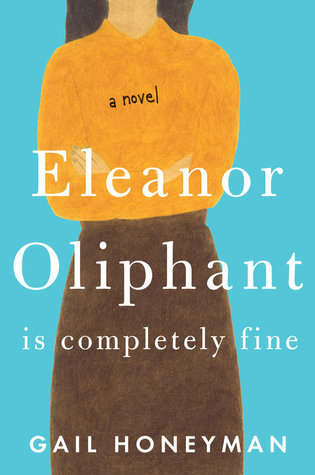
I imagine a lot of unimaginative reviews of this book say something like, Eleanor Oliphant is not Completely Fine, contrary to the title! and then they laugh at their own tiny joke for four hours. You won’t find that here, even though it is both true and apposite.
Instead you’ll see me saying: this is a really great book. Even forgetting the inspired name of the protagonist, which never stops sounding like the name of an elegant elephant, it’s really good.
Eleanor Oliphant lives alone and has forged an existence for herself of work, trips to the local Tesco Metro, and gentle, vodka-infused oblivion on the weekends. She doesn’t deal well with people.
In fact, Oliphant displays an almost total lack of empathy. At first, you suspect that she may be autistic, since she shows all the signs: difficulty relating to others, low tolerance for leaving her routines, having to learn the outward signs of emotions by rote and experience, rather than innately understanding the difference between someone who is surprised and someone who is angry. But across the book, it becomes clear that this isn’t the case – instead, she’s simply living with these symptoms as the result of a childhood trauma, which made her entirely crush down her emotional development.
The book, then, is a story about a woman unpicking her past, being helped along the way by the kindness of others. It only takes the effort of one person to look past her social inadequacies and show her continued kindness to allow her to start to do this. And that’s the heart of the book: see what a little kindness can do, even – or especially – to those who seem the most closed-off.
And yes, that all sounds terrible Hallmark and sentimental and like so much gushing vomit. But the other thing is that the book is brilliantly written. Oliphant’s pious, snobby tone contrasting with the day-to-day realities of Glasgow life is hilarious. The dramatic irony of her not fully comprehending the deeper meanings of social altercations is delicious. It manages to weave this seemingly sentimental story without coming off as sentimental at all.
Overall, it’s one of my favourite books from the 100 Book Challenge so far. I’ll leave you with a direct quote to illustrate my point:
If I’m ever unsure as to the correct course of action, I’ll think, ‘What would a ferret do?’ or, ’How would a salamander respond to this situation?’ Invariably, I find the right answer.
--
This is my nineteenth book review of 100 to raise money for Refuge, the domestic abuse charity. If you liked this review, or just want to help out, please donate on the link below!

On the back of your review I chose this for holiday reading. A great read; beautifully written. Thank you for the recommendation and good luck with the rest of the challenge Tom.
ReplyDeleteThank you so much Trudie! Really glad you enjoyed it too.
Delete